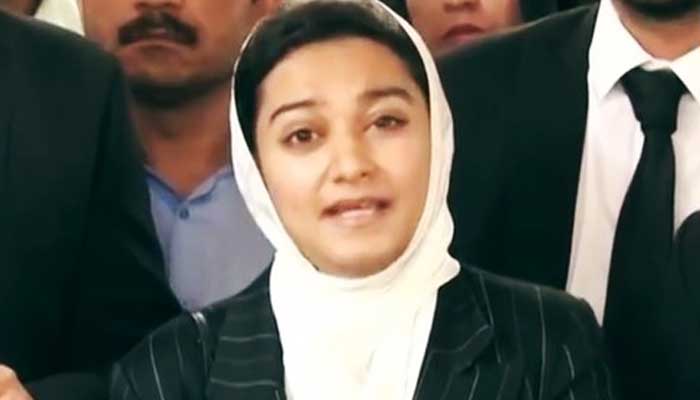Khadija stabbing case: SC sets aside LHC judgment
“For reasons to be recorded later on, this instant appeal is allowed and the judgment delivered by Lahore High Court is set aside while the Sessions Judge’s decision of March 2018, convicting and sentencing the accused for various offences are restored,” Chief Justice Asif Saeed Khan Khosa announced a short order.
ISLAMABAD: The Supreme Court (SC) on Wednesday restored five-year imprisonment of Shah Hussain, who stabbed law student Khadija Siddiqui 23 times in Lahore in May 2016, after setting aside the judgment of the Lahore High Court (LHC) acquitting him in June 2018.
A three-member bench of the apex court, headed by Chief Justice of Pakistan Justice Asif Saeed Khosa and comprising Justice Maqbool Baqir and Justice Mansoor Ali Shah, heard the appeal filed by Khadija Siddiqui against the LHC verdict acquitting Shah Hussain, her attacker and class fellow. “For reasons to be recorded later on, this instant appeal is allowed and the judgment delivered by Lahore High Court is set aside while the Sessions Judge’s decision of March 2018, convicting and sentencing the accused for various offences are restored,” Chief Justice Asif Saeed Khan Khosa announced a short order after a short break and after hearing the counsels for both the parties. The court after restoring the conviction ordered the law enforcement agencies to take Shah Hussain into custody and proceed in accordance with law.
After the announcement of the court order, Khadija Siddiqui, present in the courtroom along with her friends and parents, embraced one another. Similarly, her father and mother also present in the courtroom looked happy and received congratulations from the near and dear ones. “Today’s order of the court is a victory for every woman of the country, striving for getting justice,” said jubilant Siddiqui while addressing the media outside the Supreme Court. She lauded the verdict of the apex court, providing her justice adding truth always prevails. “The apex court verdict has proved that if you misuse your powers, you cannot escape the truth forever.” Siddiqui also praised the role, played by the media in her case, giving day to day coverage to the proceedings of her case.
Meanwhile, Shah Hussain, the accused also argued before the court on the request made by his counsel Khalid Ranjah at the end of the proceedings. In accordance with the court order, when Shah Hussain came out of courtroom No 1 along with his father and the legal team, he was taken into custody by the police.
Meanwhile, the SC dismissed a plea seeking the disqualification of Sindh Chief Minister Murad Ali for holding dual citizenship. A three-member bench headed by Justice Bandial and comprising Justice Akhtar and Justice Afridi, heard a petition filed by Roshan Ali Buriro of the Sindh United Party demanding that Shah be disqualified on account of his dual nationality.
The court dismissed the petition with the ruling that the petitioner could not provide solid evidence in the matter and failed to satisfy it. During the hearing, Justice Umer Ata Bandial observed that the Sindh chief minister had renounced his Canadian citizenship in 2013 therefore, he could not be disqualified on those grounds. The court noted that the petitioner's intent was questionable as he was a political opponent of Shah. “Prima facie we did not find any reasonable grounds for disqualification of the respondent (CM)”, Justice Umer Ata Bandial observed.
The petitioner Buriro had earlier filed a similar appeal with a returning officer and Sindh High Court, which were dismissed. The apex court noted that the appellant had not challenged the returning officer's verdict in the Election Commission of Pakistan, which is the relevant legal forum, and instead approached the high court.
-
 Prevent Cancer With These Simple Lifestyle Changes
Prevent Cancer With These Simple Lifestyle Changes -
 Experts Reveal Keto Diet As Key To Treating Depression
Experts Reveal Keto Diet As Key To Treating Depression -
 Inter Miami Vs Barcelona SC Recap As Messi Shines With Goal And Assist
Inter Miami Vs Barcelona SC Recap As Messi Shines With Goal And Assist -
 David Beckham Pays Tribute To Estranged Son Brooklyn Amid Ongoing Family Rift
David Beckham Pays Tribute To Estranged Son Brooklyn Amid Ongoing Family Rift -
 Jailton Almeida Speaks Out After UFC Controversy And Short Notice Fight Booking
Jailton Almeida Speaks Out After UFC Controversy And Short Notice Fight Booking -
 Extreme Cold Warning Issued As Blizzard Hits Southern Ontario Including Toronto
Extreme Cold Warning Issued As Blizzard Hits Southern Ontario Including Toronto -
 Lana Del Rey Announces New Single Co-written With Husband Jeremy Dufrene
Lana Del Rey Announces New Single Co-written With Husband Jeremy Dufrene -
 Ukraine-Russia Talks Heat Up As Zelenskyy Warns Of US Pressure Before Elections
Ukraine-Russia Talks Heat Up As Zelenskyy Warns Of US Pressure Before Elections -
 Lil Nas X Spotted Buying Used Refrigerator After Backlash Over Nude Public Meltdown
Lil Nas X Spotted Buying Used Refrigerator After Backlash Over Nude Public Meltdown -
 Caleb McLaughlin Shares His Resume For This Major Role
Caleb McLaughlin Shares His Resume For This Major Role -
 King Charles Carries With ‘dignity’ As Andrew Lets Down
King Charles Carries With ‘dignity’ As Andrew Lets Down -
 Brooklyn Beckham Covers Up More Tattoos Linked To His Family Amid Rift
Brooklyn Beckham Covers Up More Tattoos Linked To His Family Amid Rift -
 Shamed Andrew Agreed To ‘go Quietly’ If King Protects Daughters
Shamed Andrew Agreed To ‘go Quietly’ If King Protects Daughters -
 Candace Cameron Bure Says She’s Supporting Lori Loughlin After Separation From Mossimo Giannulli
Candace Cameron Bure Says She’s Supporting Lori Loughlin After Separation From Mossimo Giannulli -
 Princess Beatrice, Eugenie Are ‘not Innocent’ In Epstein Drama
Princess Beatrice, Eugenie Are ‘not Innocent’ In Epstein Drama -
 Reese Witherspoon Goes 'boss' Mode On 'Legally Blonde' Prequel
Reese Witherspoon Goes 'boss' Mode On 'Legally Blonde' Prequel




